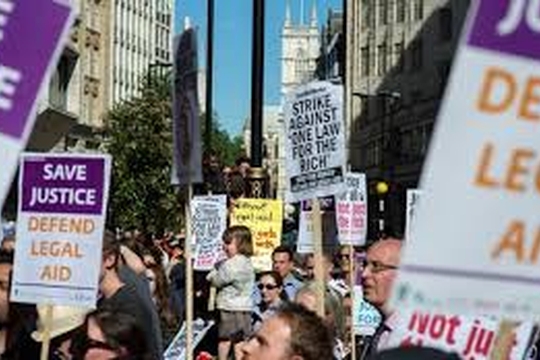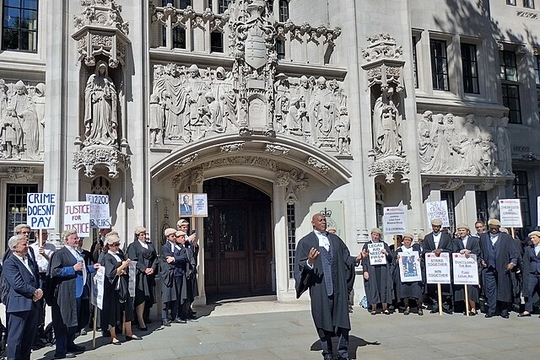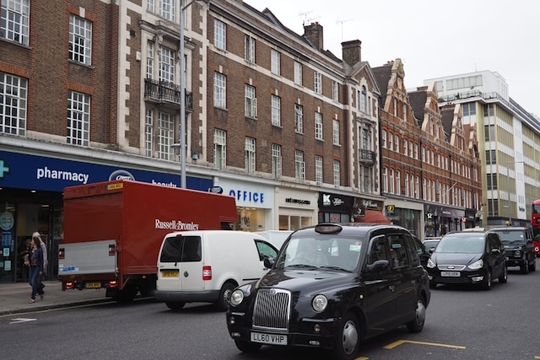Reflections on organising in a Legal Aid firm
by
Casey,
Khadijah
May 12, 2025
Featured in Legal Workers Inquiry (Book)
The experience of organising with LSWU

inquiry
Reflections on organising in a Legal Aid firm
The experience of organising with LSWU
We are former colleagues who both worked in the fields of immigration and public law at a large legal aid solicitor’s firm. We met through our membership of the Legal Sector Workers’ United (LSWU) and organised together at our workplace.
We had both been aware of the LSWU for a short while before joining and working in the legal sector. We were excited that legal workers had set up at United Voices of the World (UVW), specifically as it sought to organise precarious workers and sectors often overlooked by larger unions, and where joy and community appeared central to members’ fights for their collective rights and successes. Indeed, LSWU explicitly sought to organise all kinds of workers found in the legal sector, not just barristers and solicitors.
The LSWU had the stamp of approval from prominent legal figures such as John Hendy KC and Michael Mansfield KC, with the latter informing us of previous attempts at setting up a trade union for lawyers in the 1970s, which sadly did not survive. It appeared to us that the most well-known or public instances of lawyers organising around their working conditions occurred primarily through campaigns or working within professional associations, in a manner akin to the Royal College of Nurses for example. To establish a trade union to collectively organise as ‘workers’ seemed like a positive step forward for a profession typically viewed as individualistic and elite.
Given the nature of the sector that LSWU covered, the majority of its organising base were in larger cities. Given the dearth of unions seeking to recruit members in the sector, however, the LSWU sometimes was able to attract people from further afield. This was centred around workers based in London, but we had a strong and committed member base in Manchester, Bristol, the Midlands, and Ireland.
Our working conditions made organising a necessity and therefore both of our involvement with LSWU escalated quickly. Our workplace was notorious for exploitative conditions and it had some of the highest density of LSWU members among the firms we tried to organise in. Many people were overburdened with unmanageable caseloads and responsibility, experiencing mental health difficulties because of the nature of the work and the systemic overworking. Some were subjected to bullying, some staff were on just about minimum wage, and there appeared to be pay gaps between gender and ethnicity based on the data we collected with no pay structures in place, and many workers were outsourced.
There was a big uptake in LSWU membership at our firm with the onset of Covid-19, due to late decisions around allowing people to work from home (though only for some teams) as well as there being no entitlement to sick pay beyond statutory sick pay. While precarity levels in terms of pay varies with seniority in the legal sector, sick pay was something which was a concern across the board.
All of our meetings were online at this time because of Covid-19, with people based in several different office locations. Building trust therefore, was a challenge. Despite this however, with regular meetings and the community that being part of a union in the workplace creates, we had set up a formal channel for people to express similar themes of exploitation. Providing space for catharsis and solidarity in what can be an otherwise lonely experience was one of the most useful means of engaging people; in an often individualistic sector, this allowed people to collectively imagine what better conditions - and, for some, potentially a better world more broadly - could look like.
The trade union began to write to management, making demands around sick pay. They refused to respond to us, but taking small steps meant people began to come to meetings to discuss what we could do next. Workers across teams spoke in hushed whispers about the letter on sick pay being circulated. We eventually spoke seriously about taking industrial action, and spoke with senior staff members of the union to walk us through what we would need to, to do this. However, when it came to the wider membership putting a name to something like a consultative ballot, engagement would drop off. Writing letters was the comfort zone. Reflecting upon this, maybe there was something in peoples’ theory of change and how it mirrors how they normally achieve wins in their legal work. When it came to escalation therefore, common concerns were, causing damage to clients’ cases, perceptions of risk (particularly given the precarity of employment conditions), potential victimisation, not feeling secure in the numbers of people, and wanting to explore the longer game of securing statutory recognition.
We would also add that huge turnover rates, especially of the most precarious workers, made organising, building trust, and escalating action difficult. Membership was essentially in constant flux because of the high turnover (as is indeed the case across legal aid firms).
We had discussed alternatives to full strike action, including action short of strike in the form of a billing or chargeables strike. It would work like this: each day a worker will typically have to charge a certain amount of hours to a client to meet their targets (as set by the firm). In our case, it would be charged to the Legal Aid Agency, which directly affected the income the firm would receive through each worker’s labour. We can therefore see how exactly much we make for the firm, and we see how much we get back. Targets will be many times higher than an individual’s salary. We floated the idea that if one of our main concerns was causing damage to our clients’ cases, we could do our work without charging or billing our files for the specific time period. It could be really disruptive. However, we never really got beyond discussing it as an idea, but it seemed that this would have struck where it hurts, while causing minimal damage to our clients. We would like to explore this and other targeted actions, as an idea across the sector when we can better organise ourselves.
In terms of recruiting new members, perceptions of union membership meant that people often felt they did not ‘need’ the membership. They felt secure in their abilities to negotiate, research and navigate situations of difficulty in work, viewing union membership as an insurance package for individualised issues, rather than a means of seeking to bargain collectively.
Career progression was also a relevant theme. While this is not the case for all workers in the legal sector, when it comes to ‘fee-earning’ staff in particular, often the brunt end of precarious work is a temporary condition until qualification. That is not to say that the period of time is necessarily short, but it is time-limited at least. When it came to organising around pay, this was a relevant factor in barriers to escalation. In other words, promotion can provide an individualised remedy to some issues of precarity. Some had genuine concerns about how rocking the boat during this period could affect their career post-qualification, others could simply weather the storm for this time-limited period, through second jobs or private wealth, for example.
More generally, a huge barrier to escalation or recruitment, especially when trying to organise around pay, was a sense of sympathy for the situation of our bosses and of the sector, that the legal aid sector was underfunded and had been subjected to devastating cuts across decades, which many firms did not survive. Some therefore deeply disagreed with our target, with some having seen the closure of firms first hand during their careers. While this existential threat is clearly real, going forward, we need to figure out how we can organise around the broader public funding and survival issues of the sector which coincide with access to justice; and ensuring it is workers, not bosses, who benefit from this.
As discussed above, while the ambition for LSWU was to empower workers across the board at law firms, there were difficulties in making this a reality. Ultimately the focus was on ‘fee-earning’ workers: workers who will charge (in our case the Legal Aid Agency), a specific amount for their tasks, generating income for the firm - typically solicitors, paralegals and barristers. Since LSWU was part of UVW, there was hope that the union’s experience of organising different sectors, particularly cleaners and security staff, would assist in organising a law firm more holistically. For example, in our firm, reception staff and members of the IT team had been made redundant during Covid-19 lockdowns, and the majority of IT and HR were outsourced workers based in India. Cleaners were often employed by the building, rather than the firm itself. Reduced interactions due to Covid-19, office closures more generally, international outsourcing and heightened precarity meant few opportunities to connect, build trust and understand how we could organise together. Going forward, we want to find ways to overcome this to ensure we do not leave anyone behind and dismantle the false dichotomy between “fee-earners” and “support staff”.
There were some victories, however. Our firm did eventually roll out sick pay for positive Covid-19 test results only at the beginning, and later rolled out (quite limited) sick pay for any illness after a certain length of service. Some workers achieved pay increases by reference to gender pay gaps, made possible by the confidence of union membership and feeling able to talk about these issues despite pay gagging clauses in contracts.
What was also exciting about LSWU was its refusal to focus on ‘economic’ issues alone. Shortly after Covid-19 lockdowns began, an immigration working group was established within the branch. One of the first things that we organised together around was a public statement, linking our struggles with our clients. Our clients would often be in immigration detention centres or prisons under immigration powers, both of which were a breeding ground for Covid-19. We wrote a statement and several articles demanding the release of immigration detainees and the closure of removal centres, from the perspective of safety for legal sector workers and those detained. We used the statement to coordinate a political campaign around the importance of solidarity between us and those that were detained workers. Despite the precarity of their status, we heard from a few detained or ex-detained workers about the nature of their conditions and how they may want us to work in solidarity alongside them. International material solidarity was also an important part of LSWU, with the branch hosting trade unionists from Palestine and Sudan, for example.
At present, our time has been somewhat taken by addressing how, in our roles, we may further the causes of Palestinian liberation (as they face a genocidal onslaught at the hands of a settler colonial regime) and anti-fascism. Those fights, as we gleaned through our organising at LSWU together, are inexorably linked to the trade union movement at large (although there remains much to learn!).
Whilst the union branch is less active than it previously was, we are committed to using the lessons we’ve learned through these reflections in the future and we continue to support other workers in their struggles at work and ultimately, towards the better world that we need to see.
Featured in Legal Workers Inquiry (Book)
Subscribe to Notes from Below
Subscribe now to Notes from Below, and get our print issues sent to your front door three times a year. For every subscriber, we’re also able to print a load of free copies to hand out in workplaces, neighbourhoods, prisons and picket lines. Can you subscribe now and support us in spreading Marxist ideas in the workplace?
Read next

Introduction to the Legal Workers’ Inquiry
by
Jamie Woodcock,
Tanzil Chowdhury
/
May 12, 2025

